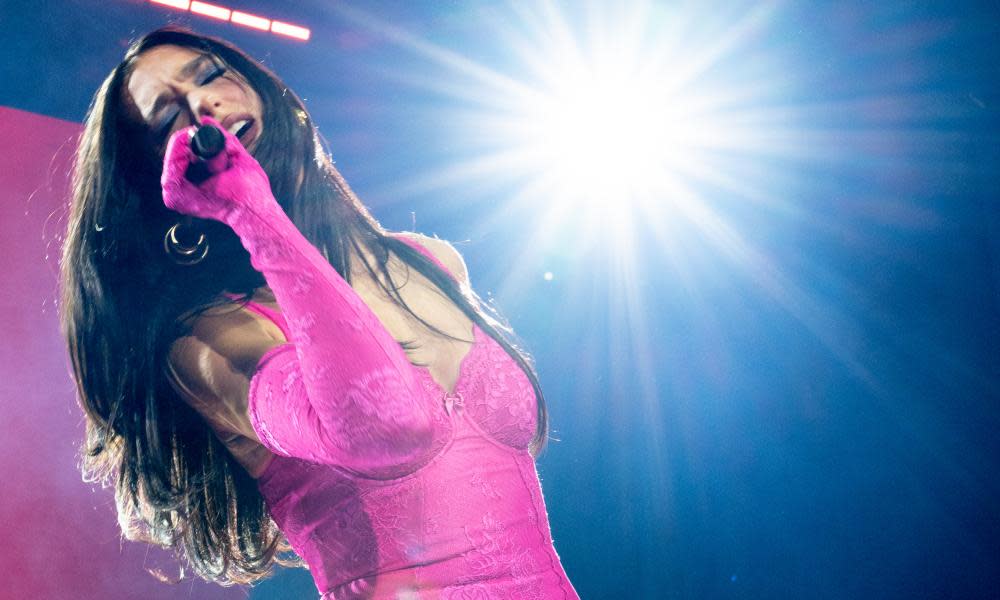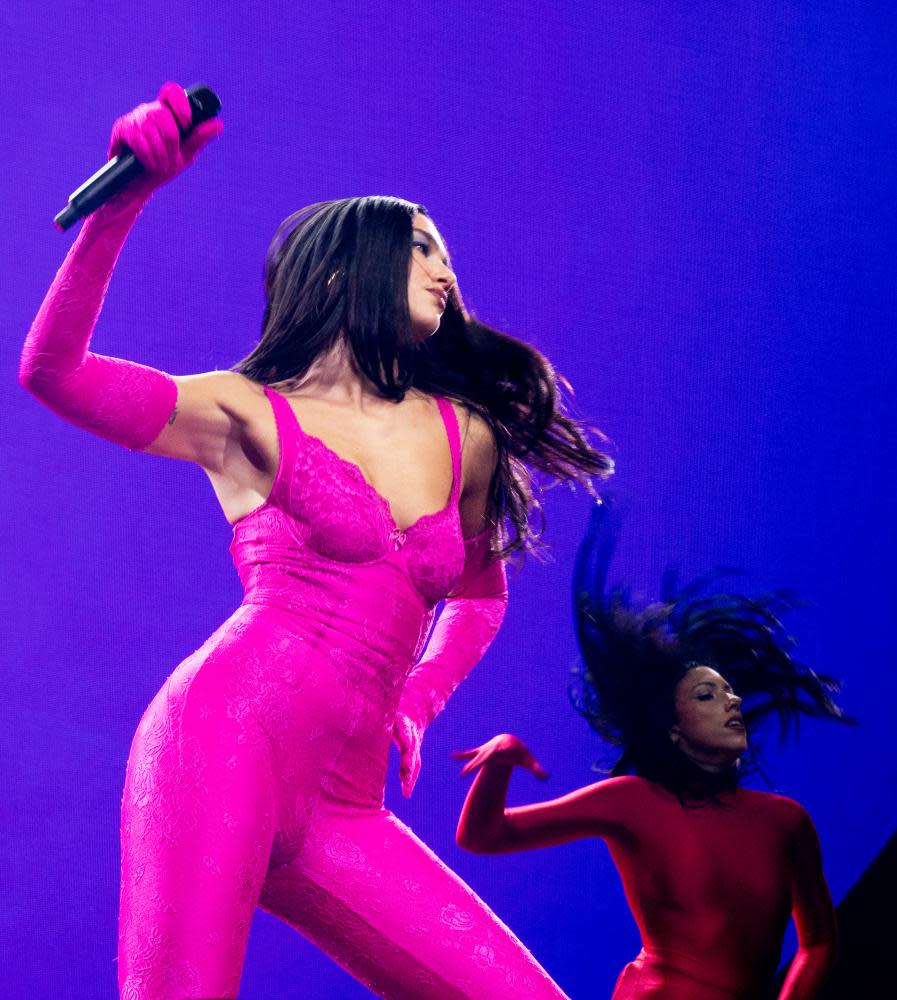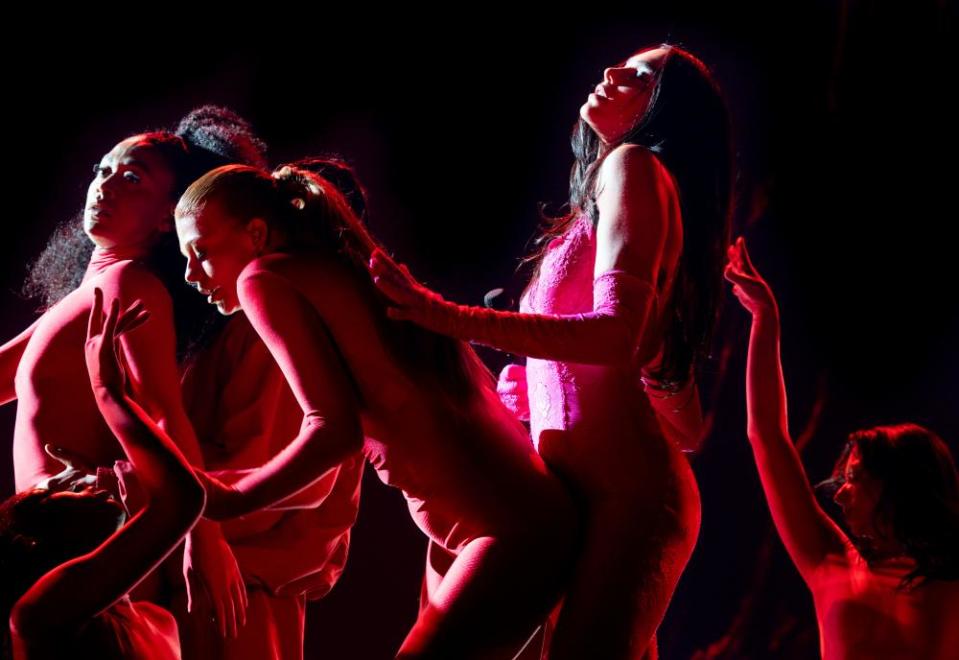Dua Lipa review – the best song catalogue in British pop today

Outside of Joe Wicks and suppliers of PPE with links to the Conservative party, few people did as well out of lockdown as Dua Lipa. At least, that’s the received wisdom about how an already successful pop singer’s career shot into a rarified realm, where Madonna and Elton John offered to collaborate with her and five million people shelled out for her pay-per-view livestreamed gig.
Released just as lockdown hit, Lipa’s second album, Future Nostalgia, turned out to be exactly what people wanted to listen to in their constrained circumstances: shiny dancefloor-focused pop, thick with knowing references to the charts of the past, that conjured enticing nightlife fantasies of what might happen when they were allowed out.
How exactly we got here is a question that hangs over the opening date of her much-postponed UK tour, not least during a section where Lipa sings We’re Good while being menaced, for reasons that aren’t entirely clear, by a giant inflatable lobster. Watching her blast through her hits and precision-tooled dance routines, you are struck by the sense that she doesn’t really conform to latterday notions of how a pop star should be.
She isn’t the kind of powerhouse singer who decorates her vocals with elaborate curlicues and tracery – her voice’s strength is its hint of husky intimacy, which vanishes live – nor is her show the kind of eye-popping spectacle that dazzles you into submission, inflatable lobster notwithstanding.

There’s some fantastic staging, particularly when she and her dancers take to a smaller stage in the centre of the crowd and a square lighting rig descends: hemmed in by its beams, they effectively conjure up the atmosphere of a nightclub dancefloor.
Equally, there are points where it can seem a little low-wattage. A balloon drop during One Kiss looks like it’s been subject to the cost-of-living crisis: there really aren’t that many balloons. She looks fantastic in a sparkly catsuit, but hers is not a career founded on bewitching charisma or outsized personality. In an era where the key to pop success is supposed to be relatability, she exudes a kind of cool, well-spoken distance: “Like modern architecture,” she sings during Future Nostalgia’s title track, “John Lautner coming your way”.
But a huge star she undoubtedly is, complete with an arena full of fans going nuts at whatever she does, even when what she does is the stuff pop starlets playing arenas invariably do: a dance routine that involves sitting backwards on a chair, a moment where she’s hoisted aloft by her dancers and carried prone around the stage, still singing.
And the gig also provides an answer to why, albeit a prosaic one. What Dua Lipa has, and has in profusion, is a noticeably better class of song than any of her British pop peers. It was a state of affairs noticeable on her debut album, as underlined by the night’s performance of New Rules, a confection made entirely of earworms and memorable lines (“if you’re under him, you’re not getting over him”), and one that becomes unignorable when the set draws on Future Nostalgia.

Tonight, songs that appeared potentiated by the privations of lockdown feel even more potent ripped from the context of the kitchen disco and rattled out at a breathless pace: Love Again’s canny reworking of the old Al Bowlly sample first used on White Town’s 1997 hit Your Woman; Break My Heart, with its knowing echo of INXS’s Need You Tonight.
An artist with a plethora of hits, she’s smart enough not to deviate from the script with anything unexpected – like a house DJ’s set, the tempo is more-or-less fixed throughout; the mid-paced beats of Cool are about as slow as her set gets – and she keeps the interludes between anthems as brief as possible. Indeed, occasionally the interludes are non-existent: a version of Hallucinate elides into a take on Cold Heart, her collaboration with Elton John, the latter appearing in video form.
Rather than outsize personality or powerhouse vocals, this is exactly what people want at this precise moment in history: a live show that delivers on Future Nostalgia’s lockdown promise of uncomplicated good times and seamless big tunes.

 Yahoo News
Yahoo News 
